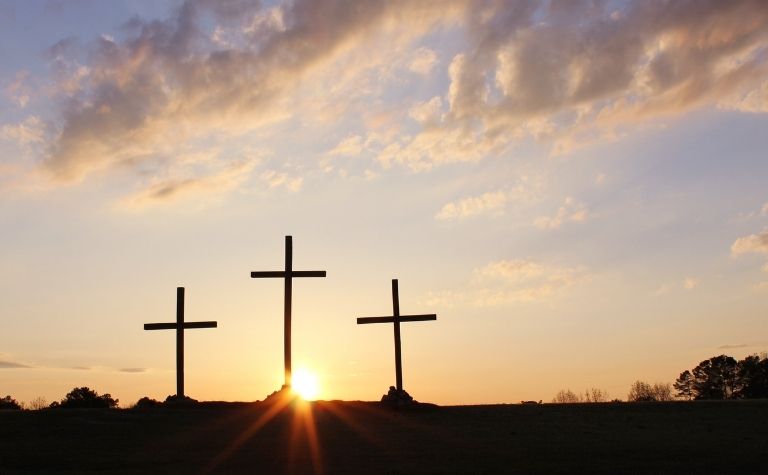The Gospels make clear that Jesus Christ was a remarkably gifted and effective teacher. People would abandon their work, risk social ostracism, upset their families, and miss meals just to hear Jesus talk about God, people, and life. Yet, Jesus was no self-help sage or trendy spiritual guru. His teaching reflected truths that were far more profound.
The Kingdom of God was the theme of Jesus’ teaching, which he said had arrived but not fully. This theme includes topics like the good news of the gospel, the rule of God and his victory over Satan, and people’s need to repent of sin and put their trust in Christ for salvation.
What is the difference between the kingdom of God and the kingdom of heaven? What exactly is the kingdom of God? Is the kingdom here now, or is it coming in the future? How does the kingdom relate to the gospel and the Church? Keep reading to learn the answers to these questions and others.
Also see Did Jesus Christ Baptize Anyone? to learn more.

Comparison: The Kingdom of God and Kingdom of Heaven
Mark, Luke, John, and Paul use the phrase “kingdom of God,” while Matthew mostly uses “the kingdom of heaven.” Nevertheless, the meaning of the phrases for each writer, which are based on Jesus’ teaching about the kingdom, is generally the same.
Why did Matthew use the phrase “the kingdom of heaven”? Matthew was primarily writing for Jewish readers, and knowing that they revered the word “God,” he didn’t want to unnecessarily offend them. The phrase “kingdom of God” appears 33 times in Matthew’s Gospel, while “kingdom of heaven” appears four times (12:28; 19:24; 21:31, 43). There is no theological difference between the terms.
How common is the phrase “kingdom of God” in the New Testament? “Kingdom of God” appears 14 times in Mark, 32 times in Luke, twice in John (3:3, 5), six times in Acts (e.g. 28:31), eight times in Paul’s letters (e.g. 1 Cor. 4:20), and once in Revelation (12:10).
The word “kingdom” alone appears many more times with multiple variations, such as:
- “the coming kingdom” (Mark 11:10)
- “your kingdom” (Matt. 6:10)
- “his kingdom” (Matt. 6:33)
- “the good news of the kingdom” (Matt. 4:23)
- “the message about the kingdom” (Matt. 13:19)
- “the subjects of the kingdom” (Matt. 8:12)
- “made us a kingdom” (Rev. 1:6)
“The whole of the preaching of Jesus Christ and His apostles is concerned with the kingdom of God.” – Christian theologian Herman Ridderbos (The Coming Kingdom, p.11)
Also see How Old Was Mary When She Gave Birth to Jesus? to learn more.

What exactly is the kingdom of God?
The kingdom of God refers to his rule and reign over history and people. Although the kingdom is supernatural and spiritual, it’s not just an immaterial reality. Although the kingdom is concrete and visible, it doesn’t only refer to a political or governmental dominion either.
What does the kingdom of God include? Incorporating Jesus’ teaching about the kingdom of God with what the Old Testament reveals about it, five aspects emerge:
- The kingdom includes God’s universal reign as king over creation (Psa. 47:7)
- The kingdom includes Israel (Exod. 19:5-6)
- The kingdom includes a king from the line of David (2 Sam. 7)
- The kingdom has arrived in the person of Jesus (Mark 1:14-15)
- The kingdom isn’t fully here yet (Matt. 25:34)
The kingdom of God isn’t a democracy. The king of the kingdom, who is Jesus (cf. Rev. 19:16), has absolute rule and governs according to his standards. The role of the king’s people, that is, followers of Jesus, isn’t to challenge the king’s standards, but to submit to them in full obedience.
Has the kingdom of God fully arrived? Jesus taught that the Kingdom of God has arrived, but that it’s not yet fully manifested. In one sense, the kingdom has arrived because Jesus has confronted and conquered Satan and demons. The Gospels illustrate this with stories about Jesus casting out demons and resisting Satan (Matt. 4:1-11).
Jesus also taught about the kingdom will one day come in full (Matt. 6:10; 25:31-46). Perhaps an analogy of the “here but not fully here” reality of the kingdom is like a war whose outcome has been decided. The victory is sure, but there are prisoners that still need rescue, enemies that still need to retreat, and some wounded that aren’t fully healed. Victory is “here” but not yet fully manifested.
“If you wish to come into God’s kingdom, therefore, you must ask God to rescue you ‘from the dominion of darkness’ and bring you ‘into the kingdom of the Son He loves’ (Col. 1:13). You must renounce your deal with the devil and swear allegiance to Christ the King.” – Philip Graham Ryken in When You Pray, p. 83-84.
Also see Why Did Peter Deny Jesus Three Times? to learn more.

The Kingdom of God, the Gospel, and the Church
The kingdom of God, while synonymous with the kingdom of heaven, isn’t the same thing as the gospel of Jesus Christ or the Church.
The “gospel,” meaning “good news,” proclaims that God, in the person of Jesus of Nazareth, became a man, lived a sinless life, and was crucified for the sins of people. Jesus took the place of sinners on the cross and bore their punishment for sin.
Sinners who respond to the good news in faith and with repentance are by God’s grace, justified and declared righteous in Christ, and are saved from sin.
As Mark 1:14-15 illustrates (see table below) that the kingdom of God and the gospel are inseparably joined together. Responding to the gospel in faith and with repentance is to become part of the kingdom of God.
| Translation | Mark 1:14-15 |
|---|---|
| ESV | Now after John was arrested, Jesus came into Galilee, proclaiming the gospel of God, and saying, “The time is fulfilled, and the kingdom of God is at hand; repent and believe in the gospel.” |
| KJV | Now after that John was put in prison, Jesus came into Galilee, preaching the gospel of the kingdom of God, And saying, The time is fulfilled, and the kingdom of God is at hand: repent ye, and believe the gospel. |
| NASB | Now after John was taken into custody, Jesus came into Galilee, preaching the gospel of God, and saying, “The time is fulfilled, and the kingdom of God is at hand; repent and believe in the gospel.” |
| NIV | After John was put in prison, Jesus went into Galilee, proclaiming the good news of God. “The time has come,” he said. “The kingdom of God has come near. Repent and believe the good news!” |
| NLT | Later on, after John was arrested, Jesus went into Galilee, where he preached God’s Good News. “The time promised by God has come at last!” he announced. “The Kingdom of God is near! Repent of your sins and believe the Good News!” |
At the beginning of the chapter, Mark declares that his Gospel is about “the gospel of Jesus” (1:1), yet the kingdom of God dominates Jesus’ teaching in the book.
Is the kingdom of God the Church? The kingdom of God and the Church aren’t synonymous but are closely related. The Church is where the people of God, who have responded to the gospel and are part of the kingdom, worship, fellowship, and grow in their faith together. People can be part of a church, but not part of the kingdom if they haven’t responded to the gospel.
Also see Why Was Jesus Christ Arrested? to learn more.
What did Jesus teach about the kingdom of God?
- Matthew 6:33, “But seek first the kingdom of God and his righteousness, and all these things will be added to you.”
- John 18:36, “Jesus answered, “My kingdom is not of this world. If my kingdom were of this world, my servants would have been fighting, that I might not be delivered over to the Jews. But my kingdom is not from the world.”
- Luke 17:20-21, “Being asked by the Pharisees when the kingdom of God would come, he answered them, “The kingdom of God is not coming with signs to be observed, nor will they say, ‘Look, here it is!’ or ‘There!’ for behold, the kingdom of God is in the midst of you.”
- Matthew 16:19, “I will give you the keys of the kingdom of heaven, and whatever you bind on earth shall be bound in heaven, and whatever you loose on earth shall be loosed in heaven.”
- Matthew 25:34, “Then the King will say to those on his right, ‘Come, you who are blessed by my Father, inherit the kingdom prepared for you from the foundation of the world.”
- Matthew 12:28, “But if it is by the Spirit of God that I cast out demons, then the kingdom of God has come upon you.”
- John 3:3, “Jesus answered him, ‘Truly, truly, I say to you, unless one is born again he cannot see the kingdom of God.'”
Also see Was Jesus A Refugee? to learn more.
Jesus as a teacher
The Gospel record reflects that Jesus was a remarkably effective teacher. The Greek word translated “teacher” (didaskalos) has a straightforward meaning. It refers to a person who has expertise in a certain field and conveys information to other people. Depending on the English translation, the word may be rendered “teacher” or “Master.”
Matthew, Mark, Luke, and John use the word “teacher” to describe Jesus more than 40 times. Jesus himself also uses the word twice to describe himself. Matthew 10:24 reads, “A disciple is not above his teacher, nor a servant above his master.” And Matthew 23:8 reads, “But you shall not be called ‘Rabbi,’ for your Teacher is One, and you are all brothers.”
Jesus was a creative teacher, using different styles and forms to convey his message. The form he used most was a parable. Scholars estimate that Jesus taught between 55-75 parables, depending on how certain sayings are classified (e.g. parable or metaphor).
Other teaching forms that Jesus used include parallelism (Matt. 7:7-8; Mark 9:37), hyperbole (Matt. 5:29-30), puns (Matt. 16:18), similies (Luke 13:34), metaphors (Matt. 5:13), proverbs (Matt. 26:52), riddles (Matthew 11:11), paradox (Mark 12:41-44), irony (Matt. 16:2-3), counterquestions (Mark 3:1-4).
“Jesus was an extraordinary teacher. Without the use of modern-day technology, he was able to captivate his audience. At times his skills as a teacher drew such crowds that they created serious problems for him. He once had to teach in a boat because of the size of the crowd (Mark 4:1). People were so mesmerized that they forgot about the basic necessities of life” (cf. Mark 6:30-44; 8:-10). [1]
Also see Did Jesus Wash Judas’ Feet? to learn more.
References:
[1] Jesus the Messiah by Robert Stein. p. 123-124.
Related Articles
Joseph and Mary's relationship, including their betrothal and marriage, is one of the most iconic in the Bible. Mary is young, devout, and contemplative. Joseph is humble, obedient, and protective....
Jesus of Nazareth has many names in the Bible, such as Immanuel (Matt. 1:23), Lamb of God (John 1:36), and the Word (John 1:1-2). Some of his names are titles like Christ (Col. 1:15), Son of Man...
